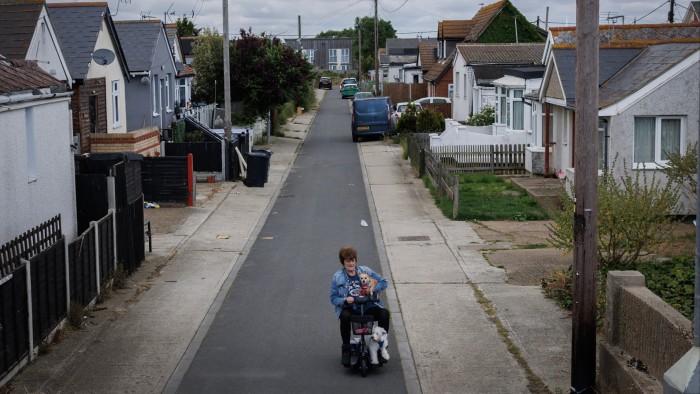Unlock the Editor’s Digest for free
Roula Khalaf, Editor of the FT, selects her favourite stories in this weekly newsletter.
The writer is chief executive of the Health Foundation think-tank
Plot a map of poor health in England and overlay it with where Reform UK saw its strongest vote share in the general election — the North East, Lincolnshire, east Kent, Essex, Barnsley, Hull, Rotherham — and there’s a striking match. The same pattern resurfaced in this month’s local elections. Might ill health be the secret sauce that helps Nigel Farage’s party win next time?
The roots go deep. Ill health is tightly bound up with poverty, fraying social infrastructure, economic inactivity and a slow-motion collapse of local civic and social life. These aren’t communities that suddenly fell ill. They’ve been quietly bleeding for decades — casualties of deindustrialisation, the financial crisis, austerity, the pandemic, and a long slide in living standards.
It shows not just in places, but in people. Life expectancy in the UK has stalled since 2011, more than in other high-income countries. New analysis published by the Health Foundation based on research from the London School of Hygiene & Tropical Medicine shows worse: an uptick in deaths among 25- to 49-year-olds, people of prime working age. That’s relatively young people. Around 70 per cent are so-called “deaths of despair” — suicide, drugs, accidents or alcohol. In some regions, people can expect to live in good health only until their early fifties.
People in these places also have the lowest trust in government and the least faith in improvement. And people in these areas are among the least socially mobile populations in the UK. They’re home to voters who don’t believe anyone’s listening — and are increasingly drawn to parties that at least pretend to. Brexit, Boris Johnson, and the current Labour government gained their support for change. Reform UK, with its talk of betrayal and decline, is the latest.
We’ve been here before. From New Labour’s Neighbourhood Renewal Strategy to the shortlived “levelling up” agenda, and more, governments have cycled through policy experiments with varying levels of commitment and coherence. Results have been mixed but improvements proved possible when linked to funding and stable policies over five to 10 years. But political attention has been uneven and investment intermittent. Meanwhile, health and hope have continued their quiet retreat.
Although it received little fanfare, the government’s £1.5bn plan for neighbourhoods, targeting 75 left-behind areas, displays welcome ambition. Putting local people in charge, giving them the resources and authority to make visible changes — things that restore pride and confidence — will make a difference. Even modest action — a reopened community centre or repaired playground, a place to meet — can spark belief that the future might be better than the past.
So far, Labour’s health mission has focused on the NHS. But this alone won’t reverse early death in deindustrialised towns or counter the political damage from ill health. The upcoming 10-year plan is an opportunity to go further, particularly with the idea of neighbourhood health centres bringing together NHS services with housing, employment, mental health and other services. Some already exist — but not nearly enough, and not where need is greatest.
Public attitudes are shifting too. Traditionally, conversations about health fixate on two themes: protecting the NHS and lifestyle choices such as laying off booze, burgers and fags. But research reveals growing awareness of the impact on health of wider determinants like poor housing and ultra-processed food. And while Reform voters may cheer a pint-wielding, cigarette-puffing Farage, it turns out many also want a more, not less, active state when it comes to fixing these root causes.
Polling suggests that these voters are fed up with being ignored. They want action. If only for these reasons, Labour can’t afford to wait to tackle health.

